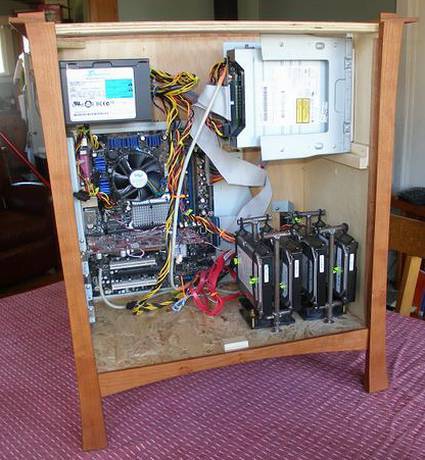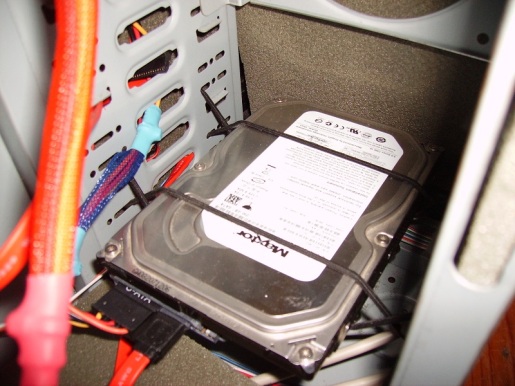
One of the most recognizable things when it comes to PCs are the various impressive looking cases that make them seem so attractive.
Naturally, those cases are also pretty expensive, but people find them attractive enough to justify paying the price. They are also marketed on their various features such as “tool less” design or great anti dust and thermal properties.
However, most people will just build or buy a computer and have it either in an old case or in some random cheap case they bought.
So are expensive and high quality PC cases worth it?
In truth, there is no simple answer.
It depends on many factors such as the kind of build, what it’s used for, who’s using it and the overall budget.
A good computer case offers many benefits, but it should be the last priority of the average build, simply because it doesn’t affect performance. A computer built in a cardboard box and a computer built in a 150 euro full tower case, will perform exactly the same. The only possible difference in performance will exist if one case has horrendous airflow which can increase temperatures and potentially limit performance.

Like I said though, things are not as simple as dismissing a good case because it doesn’t affect performance. Aside from the looking good part, a high quality case has many practical benefits.
One benefit is ease of use when it comes to installing and removing hardware within it. A low quality case will often have poorly placed slots that can turn fiddling with the hardware into a nightmare. Additionally the metal might be very cheap, causing materials inside it to bend and move about which makes placing things on them difficult, screw holes might not align properly with the hardware and create extreme difficulty in placing it, or even damage to the hardware if one is not extra careful.
Really cheap cases are also a potential hazard, since it’s pretty easy to get cut on the rough materials inside.

Lack of vibration is another benefit of high quality cases. Cheap cases suffer from vibration due to their poorly designed slots and cheap materials. The metal of the case might be so thin that it vibrates tremendously when in contact with a hard, a fan, or any other component that produces vibration.
That can lead to noise that can vary from mildly annoying to extremely loud.
For example I have a home theater PC that sits in the living room and because it’s in a really cheap(but good looking) case, when I first started using it, the noise coming from the hard drive syncing up with the case would literally wake up the whole house and I’d have people yelling at me to find a solution. I eventually had to unscrew the hard drive and suspend it from shoelaces that I put inside the case to make it silent. (there is nothing a Google search can’t solve).

Good airflow is also an important attribute of a well designed case.
Airflow is important for keeping temperatures at normal rates, but in some cases it’s a bit overrated. Yes you might notice a difference in temperatures depending on your case, but that doesn’t mean much. As long as the inferior case doesn’t get you into temperatures that are too high, you should generally be fine if you’re an average user. Serious gamers that over-clock their hardware and need to squeeze out every drop of performance from their system, are the only ones that should worry about small differences in temperatures.
Dust resistance is essential for a high quality case. High quality cases have dust filters that have two functions. The first one is that they prevent excessive amounts of dust from entering the case. The second one is that they act as dust collectors, that make keeping your computer clean much easier. That’s because in many cases you can just suck the dust right off the filters with a vacuum cleaner and that is pretty much all you need to do to keep the computer dust free. Most cases also have removable dust filters that you can just easily remove and clean up, but in many cases those are not very well designed and it’s easier to just suck the dust right off with a vacuum cleaner.
A case without dust filters will inevitably get your components clogged up with dust that will raise your temperatures significantly and potentially make them high enough to force your computer to constantly shut down.
Dust also gets in the bearings of the various component and case fans and makes them noisy, or even damages them enough to make them stop working. Especially if you have pets around, pet hair is very capable of getting wrapped inside fans and destroying them.

Last but not least, silence is a very underrated benefit of high quality cases.
Ok to be fair, not all expensive cases are silent, but many of them are. Additionally, there are some that are specifically designed to be as silent as possible and even feature sound proofing material on their insides.
Alright so those are the main benefits of a high quality case. At first it might seem like they are nothing but expensive accessories to please yourself and impress your friends with, but they do actually come with substantial benefits.
My recommendation is to stick with a random case if you’re on a very tight budget, until you can finally save up enough to get a good case. It’s really not worth it to sacrifice computer performance to save money for a good case. However, once you’ve done your build, a future upgrade of the case should definitely be in your plans due to the benefits I mentioned.
Don’t forget that a good computer case is often a one-time purchase that will stay with you and benefit you virtually forever. Most of the time, even physically damaging a high quality case is pretty hard, unless there is a design/build defect somewhere.
Oh yeah, while I’m making that point, why don’t you go ahead and check out the PC case panel of the picture below surviving multiple shotgun blasts right here.

At the end of the day though, it’s all personal preference. I’m just giving you the facts!
I hope this guide has been useful.
I’ll make another post highlighting the different kinds of PC cases and which one will suit you, depending on your needs.
If you have any questions, suggestions or even disagreements, please comment them on here and we can talk about them. You can also email me at: kn.angel@yahoo.com
Join the PCForNewbies community on facebook!
Thanks for reading!
*All pictures are taken from the web*

